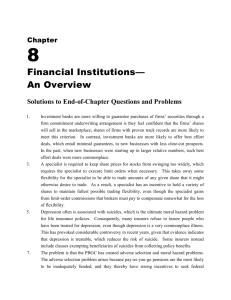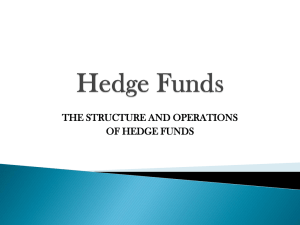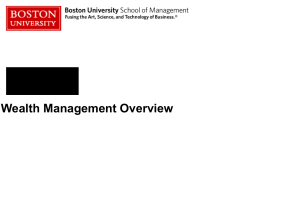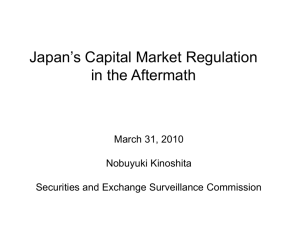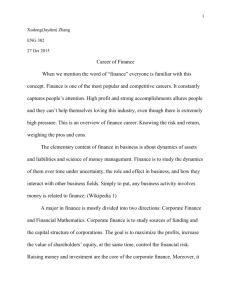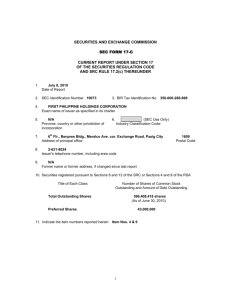Hot Issues Article
advertisement
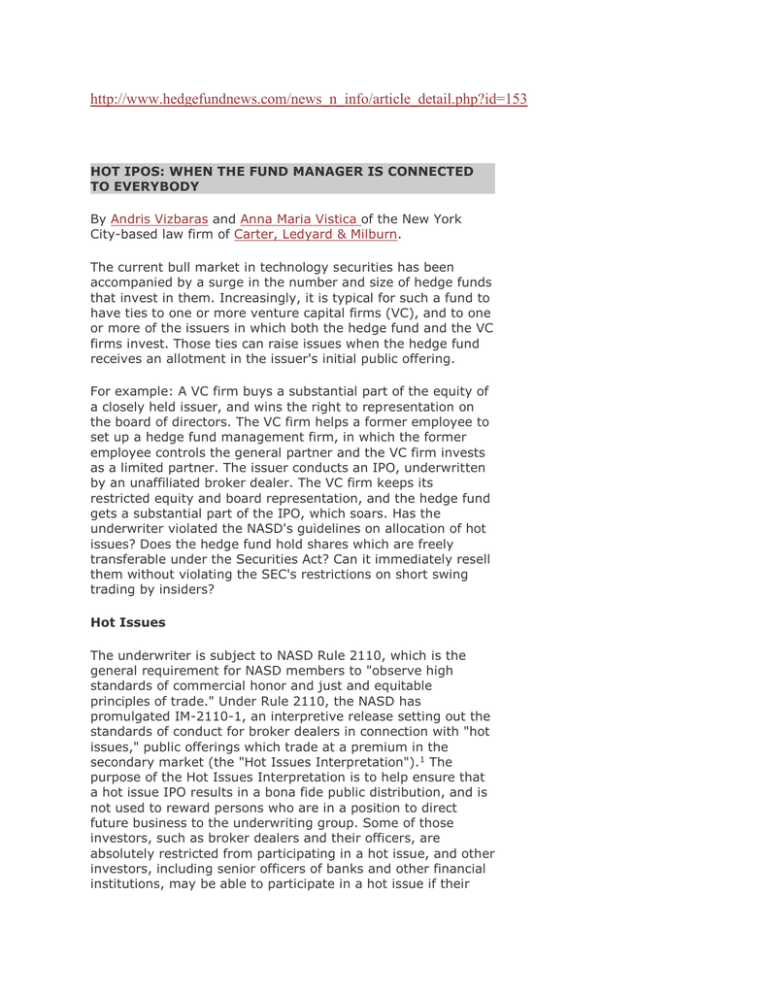
http://www.hedgefundnews.com/news_n_info/article_detail.php?id=153 HOT IPOS: WHEN THE FUND MANAGER IS CONNECTED TO EVERYBODY By Andris Vizbaras and Anna Maria Vistica of the New York City-based law firm of Carter, Ledyard & Milburn. The current bull market in technology securities has been accompanied by a surge in the number and size of hedge funds that invest in them. Increasingly, it is typical for such a fund to have ties to one or more venture capital firms (VC), and to one or more of the issuers in which both the hedge fund and the VC firms invest. Those ties can raise issues when the hedge fund receives an allotment in the issuer's initial public offering. For example: A VC firm buys a substantial part of the equity of a closely held issuer, and wins the right to representation on the board of directors. The VC firm helps a former employee to set up a hedge fund management firm, in which the former employee controls the general partner and the VC firm invests as a limited partner. The issuer conducts an IPO, underwritten by an unaffiliated broker dealer. The VC firm keeps its restricted equity and board representation, and the hedge fund gets a substantial part of the IPO, which soars. Has the underwriter violated the NASD's guidelines on allocation of hot issues? Does the hedge fund hold shares which are freely transferable under the Securities Act? Can it immediately resell them without violating the SEC's restrictions on short swing trading by insiders? Hot Issues The underwriter is subject to NASD Rule 2110, which is the general requirement for NASD members to "observe high standards of commercial honor and just and equitable principles of trade." Under Rule 2110, the NASD has promulgated IM-2110-1, an interpretive release setting out the standards of conduct for broker dealers in connection with "hot issues," public offerings which trade at a premium in the secondary market (the "Hot Issues Interpretation").1 The purpose of the Hot Issues Interpretation is to help ensure that a hot issue IPO results in a bona fide public distribution, and is not used to reward persons who are in a position to direct future business to the underwriting group. Some of those investors, such as broker dealers and their officers, are absolutely restricted from participating in a hot issue, and other investors, including senior officers of banks and other financial institutions, may be able to participate in a hot issue if their participation is consistent with their normal investment practice and certain other conditions are met. Under the Hot Issues Interpretation, an NASD member may sell a hot issue to the account of a hedge fund only if the member either (a) has reviewed a current list of the names and business connections of all persons having any beneficial interest in the hedge fund, and has concluded on the basis of that information that the hedge fund has taken appropriate steps to limit the participation of restricted investors, or (b) has received a letter from the hedge fund's certified public accountant or counsel, stating that the accountant or lawyer has performed a similar review of the investors in the hedge fund and has reached a similar conclusion. If the hedge fund has restricted investors, it must establish a separate brokerage account, in which the restricted investors may not participate, to purchase the hot issue securities.2 Under the Hot Issues Interpretation, so long as the hedge fund manager in our example provides the underwriter with the requisite "hot issues" letter from its counsel or CPA3 to the effect that the fund has taken the required steps to determine whether each of its investors is restricted and to establish a separate hot issues account if necessary, the underwriter may allocate shares to the hedge fund or its hot issues account. Transferability Section 5 of the Securities Act generally prohibits the sale of any security unless a registration statement is in effect for that sale or an applicable exemption from the registration requirement is available. Section 5 applies each time a security is sold, whether by the issuer or others, and whether or not a prior sale of the same security was registered. Typically, after an issuer registers a public offering of shares, those shares are traded among investors without further registration in reliance on Section 4(1) of Securities Act, which exempts any transaction by any person "other than an issuer, underwriter or dealer." However, if those same shares at any time are bought by a person who directly or indirectly controls the issuer, or is controlled by the issuer, or is under common control with the issuer, the next purchaser of those shares is presumed to be an "underwriter" under Section 2(11) of the Securities Act, and may not rely on Section 4(1). The term "control" is not defined in the Securities Act for the purposes of Section 2(11), but an instructive definition is provided by Rule 405, which defines "control" in a separate context as "the possession, direct or indirect, of the power to direct or cause the direction of the management and policies of a person, whether through the ownership of voting securities, by contract, or otherwise." Even given that the VC firm in our example does not have outright voting control of the issuer, its substantial block of equity and its seat on the board may give it "control" for the purposes of Section 2(11), especially if no other investor has a comparable block of shares. Given those facts, it is especially significant and helpful that the VC firm took only a limited partner interest in the hedge fund manager, because a limited partner ordinarily has no ability to control the partnership. Conversely, if the VC firm, with its control of the issuer, also controlled the hedge fund through its manager, then the hedge fund would be under common control with the issuer, and the shares which the hedge fund receives in the IPO would be restricted under the Securities Act. In that case, the hedge fund could resell the shares in reliance on the IPO registration statement only if the registration statement named the hedge fund as a selling shareholder. Otherwise, the hedge fund would have to treat the shares as restricted, and generally only could resell them in a private placement. Short Swing Profits Section 16(a) of the Securities Exchange Act requires any officer, director or any person who is directly or indirectly the "beneficial owner" of more than 10% of any class of any registered equity security to file certain reports with the SEC. Section 16(b) of the Exchange Act generally requires such an officer, director or 10% beneficial owner to disgorge any profit realized from any purchase and sale, or sale and purchase, of any equity security of the issuer within a period of six months.4 A person generally is a "beneficial owner" of a security, for the purpose of determining whether the person is subject to reporting requirements and short swing liability under Section 16, only if the person, directly or indirectly, through any contract or otherwise, has or shares voting power or investment power over the security. A limited partner ordinarily is not a beneficial owner of a security held by the partnership, for these purposes, because a limited partner ordinarily has no ability to direct the voting or disposition of the security. Therefore, an investor in a hedge fund ordinarily need not count the securities held by the hedge fund together with the investor's own holdings of that security in determining whether the investor is subject to reporting requirements and short swing liability under Section 16 for that security. Even more clearly, the hedge fund need not count independent holdings of the investor, since it ordinarily has no power over those holdings. However, given the relationships among the hedge fund and the VC firm in our example, both of them should carefully consider two additional provisions relating to Section 16. The first is Rule 13d-5(b)(1), which states that whenever two or more persons "agree to act together" for the purpose of acquiring, holding, voting or disposing of equity securities of an issuer, that "group" is deemed to have beneficial ownership of all equity securities of the issuer beneficially owned by any of its members. The second is Rule 13d-3(b), which disregards any "contract, arrangement or device" which has the purpose or effect of divesting beneficial ownership of a security "as part of a plan or scheme to evade" the requirements of Section 16. As an elaboration of our example, let's say that the VC firm had agreed with the hedge fund to use its influence to induce the issuer to allocate IPO shares to the hedge fund, in exchange for something of value from the hedge fund (on top of the VC firm's carried interest in its profits, as a limited partner in the manager). That arrangement would raise a serious question of whether, under Rule 13d-5(b)(1), the VC firm and the hedge fund acted as a "group" for the purposes of acquiring the IPO shares. (Such an arrangement also would raise questions as to whether the manager, as an investment adviser and fiduciary of the hedge fund, had fully disclosed the fund's expenses.) If they were held to have acted as a group, the holdings of the VC firm and the hedge fund in the security would be counted together, and if the total exceeded 10% of the class, they would have liability for profits from short-term trading in the security. The VC firm also would have a risk that the arrangement would be held an illicit "plan or scheme" under Rule 13d-3(b) to conceal its beneficial ownership of the shares allocated to the hedge fund. Conclusion A hedge fund manager that has significant ties to an issuer, directly or through a VC firm which sponsored the issuer, should consider the Hot Issues Interpretation of the NASD, the registration requirements of the Securities Act and the short swing profit restrictions under the Securities Exchange Act when structuring its relationships with the issuer and the VC firm. In particular, if the VC firm holds 10% or more of the common shares of the issuer, or controls the issuer through share ownership or otherwise, the hedge fund manager must avoid any arrangement which gives the VC firm control of the hedge fund manager or a right to share profits of the hedge fund from trading shares of the issuer, because those arrangements could severely restrict the ability of the hedge fund to resell its shares of the issuer. _______________________ The NASD recently filed a proposed rule change which would delete the Hot Issues Interpretation and replace it with a new 1 Rule 2790. SEC Rel. No. 34-42325. If adopted, NASD Rule 2790 would permit restricted persons to own up to 5% of the hedge fund in the aggregate, and would permit the underwriting group to rely on the representations of the hedge fund directly. The fund still would be able to "carve out" restricted persons, by establishing a separate hot issues account to bring aggregate restricted interest in the account below 5%. 2 (or, after adoption of rule 2790, provides sufficient evidence directly to the underwriter). 3 A beneficial owner of registered equity securities also is required to file a report under Section 13(d) of the Exchange Act when the beneficial owner passes a 5% threshold. 4
